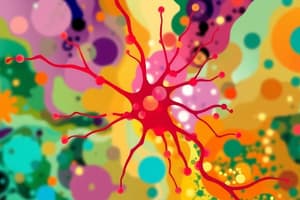Podcast
Questions and Answers
What does the term biotechnology represent?
What does the term biotechnology represent?
- The study of ancient human civilizations
- A fusion of biology and technology (correct)
- A discipline exclusive to agricultural practices
- An alliance between mathematics and biology
In what year was the term biotechnology introduced?
In what year was the term biotechnology introduced?
- 1900
- 6000 B.C.
- 4000 B.C.
- 1917 (correct)
How did Karl Ereky define biotechnology?
How did Karl Ereky define biotechnology?
- All work producing products from raw materials using living organisms (correct)
- A technique for large-scale agricultural efforts
- As methods to engineer living organisms
- All lines of work utilizing flora and fauna
Which of the following is considered an ancient practice related to biotechnology?
Which of the following is considered an ancient practice related to biotechnology?
What aspect of biotechnology has historically been emphasized over the years?
What aspect of biotechnology has historically been emphasized over the years?
What distinguishes modern biotechnology from traditional biotechnology?
What distinguishes modern biotechnology from traditional biotechnology?
Which of the following best summarizes the current understanding of biotechnology?
Which of the following best summarizes the current understanding of biotechnology?
How have traditional biotechnological practices evolved in recent years?
How have traditional biotechnological practices evolved in recent years?
What aspect of biotechnology has contributed to the confusion regarding its definition?
What aspect of biotechnology has contributed to the confusion regarding its definition?
Which term refers to the broad view of biotechnology by the European Federation of Biotechnology?
Which term refers to the broad view of biotechnology by the European Federation of Biotechnology?
Flashcards are hidden until you start studying
Study Notes
Definition of Biotechnology
- Biotechnology merges biology and technology, officially introduced in 1917 by Karl Ereky.
- Defined as the utilization of living organisms, cells, and their derivatives to produce products from raw materials.
- Historical practices like brewing, fermentation, and basic food production date back to 6000 B.C.
Old and New Biotechnology
- Old biotechnology includes traditional methods for food production, such as beer, wine, cheese, and yogurt.
- New biotechnology integrates genetic manipulation, cell fusion, and modern techniques into traditional practices.
- The European Federation of Biotechnology defines it as the integration of natural sciences and organisms for products and services.
Historical Perspective
- Biotechnology’s roots trace back to early biodegradable processes (e.g., yeast in beer, bacteria in yogurt).
- Major contributors: Louis Pasteur established microorganisms' role in fermentation in 1876; Edward Buchner extracted enzymes from yeast in 1897.
Milestones in Biotechnology
- 1981: First monoclonal antibody diagnostic kits approved in the U.S.
- 1982: Approval of human insulin produced via recombinant DNA technology, marking a significant pharmaceutical advancement.
- 1982: First animal vaccine produced through recombinant DNA technology received approval in Europe.
Scientific Foundations
- Biotechnology draws from various sciences, including:
- Biochemistry
- Genetics
- Molecular Biology
- Chemical Engineering
- Bioinformatics
- A diverse range of scientific fields contributes to biotechnology, leading to innovative applications and processes.
Emerging Technologies in Biotechnology
- Key biotechnological methods include:
- Cell and tissue culture technology
- Transgenesis technology
- Antisense technology
- DNA chip technology
- Immunotechnology
- Metabolic engineering
- Growth techniques such as stem and branch cultivation further enhance agricultural biotechnology.
Studying That Suits You
Use AI to generate personalized quizzes and flashcards to suit your learning preferences.




